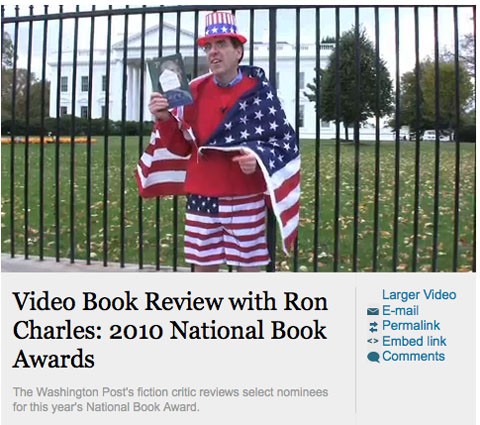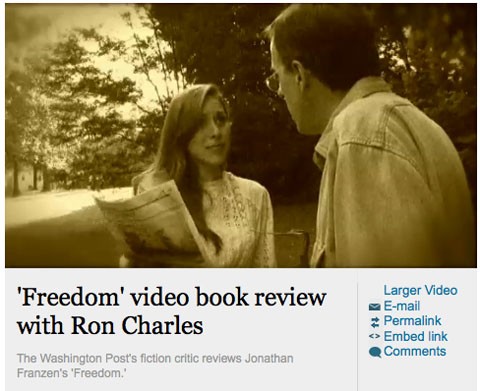I’m struggling to restrain another piece from balloning, festooning into an essay — on that age-old, timelessly tedious topic of books going e-. So I’m going to offer a far more delicious, and still booky, distraction, in the form of Ron Charles.
Ron Charles, deputy editor of the Washington Post‘s Book World, may be my favourite book reviewer. He may not be as hot as James Wood, who’s so inflammatory there’s a site against him, or as icily cool as J M Coetzee, the only critic to have won the Nobel and two Bookers, but Ron Charles has many virtues that draw him close: he is judicious but merciful; rigorous but generous; he is open to delight and warm to the touch. And of late, he has become a performative book critic: “Fast, fun and totally hip.”
(In the second bit below, I’ve quoted more seriously toned remarks from Charles on the difference between criticsm and reviewing, and the responsibilty of reviewers in a world of publishing avanlanches, even as books go e-. As a book consumer in regular dilemmas, it cheers me up that Charles champions a reader-enabling approach.)
Here, Charles charges through the National Book Awards fiction shortlist, (winner announced tomorrow, Nov. 17), dispensing hectic wit and bon bon mots. He astutely casts doubt on Peter Carey’s eligibility with his Parrot and Olivier. (I can’t embed the wretched thing, so you’ll have to follow this link and select this video:

(Why does he do this, you ask? Nieman Storyboard asked too: ‘My family and I used to do this kind of thing for my extended family and friends. We would do parodies of holidays, based on TV shows … I was frustrated that I hadn’t done anything lately. I’d had this idea for a comic, satirical book review character. I said to my wife, “Why don’t we just throw this together?” So we literally just broke my review for that week down into scenes, filmed it around the house …’)
There are currently ten video reviews on his page at the Post, all of the hi-lowest standards and equally spiffing. Check out the review featuring his bacon hairpiece or the “Spooktacular” to see Charles in a LBD and pearl necklace. His take on Jonathan Franzen’s Freedom includes a loving send-up of industry hype, literary section cheersquads, reviews, and also his own weary, histrionically frank response to a book that may be just too much.

At the 57′ mark: ‘The literary chat started long before anyone could buy it. The [NY] Times ran their first review of Jonathan Franzen’s literary masterpiece back in 1834 …
Girl, excited: “Pa! Pa! They say it’s a ‘liminal, lapidary masterpiece.’ What does it mean, Pa?” Pa, ponderous: “I don’t know. I don’t reckon anybody knows.” ‘
+ + +
‘The whole distinction between critics and reviewers’
At Bookslut the interviewer notes, ‘You’re widely known as fair and generous … [an] example: you reviewed Apologize! Apologize!, Elizabeth Kelly’s first novel, and in there you said, “It’s good enough to overcome its flaws.” ‘
Charles spells out his position (which I expect would peeve many critics):
As far as being generous, maybe more than ever, I am so in awe of the talent that I have the privilege of reading every week. There are so many wonderful novelists out there. As I am reading their books, I feel the weight of their time, and their feelings in the most superficial sense. I guess I’m probably more sensitive than other critics — better critics — to authors’ feelings. In the sense that somebody worked on this for years, her husband loved it, and then she got an agent to like it, and then they got an editor to like it, and a whole group of serious thoughtful people likes this book. So if I’m going to crap all over it, I’m going to have a really good reason. Not just that I’m not getting enough sleep this week or I have some pet peeve with the subject or with some narrative tic this particular author likes. There had better be some substantial reason to not like the book, some critical reason that is important to readers. It’s another pet peeve of mine — if you just don’t like a book, who cares? I’m trying to help my readers at the Post figure out if they might like the book or not, if it’s something they want to read. This brings up the whole distinction between critics and reviewers.
And that distinction between a critic and a reviewer is:
In my mind, reviewers, like myself, are looking at books that are out there and trying to help you decide what you might enjoy reading. Critics are trying to lay down some sort of literary principles and see how they are being applied in literature; it’s a little academic, and much more for the ages. Some very fine reviewers do blend these two very effectively. James Wood of course, but he does seem more of a critic than a reviewer to me.
Finally, someone has explained it.
Still, Charles is a good enough critic, or reviewer, to have won the Nona Balakian Citation for Excellence in Reviewing at the National Book Critics Circle last year. Here is his super, funny, and altogether winning winner’s speech (there’s a lot of reverb). He may have picked up his hammy skills from when he used to teach high school with Jon Hamm, you know, Don Draper:
At the 3:24′ mark he hews to the point:
Some of us are pining for the good old days, say 90 years ago, when TS Eliot ruled over literary criticism, or 130 years ago when Henry James and his friend William Dean Howells taught Americans what they should be reading, or 200 years ago when Coleridge was laying down the principles of literary criticism.
I would suggest that at this moment many of us should be looking further back, say, 80,000 years ago. We need to be better hunter-gatherers.
I know there’s long been a tension in this room between those of us who felt we’ve been writing criticism with a capital C, and those of us who thought of ourselves as mere newspaper book critics — the implication is that helping people find books they might just want to enjoy reading is something of a low-life consumer report for books. I think we ignore that role at our peril.
At 6:55:
The number of books continue to rise. The advent of self-published books only exaggerate the situation. I’m already getting about 150 books a day (gasps) … for all Kurt Ansdersen’s celebration of the long tail, from where I sit, it looks like a lot of ass.
… The problem with helping people find books they want to read is only going to get more extreme, and if we don’t step up to the task most people will be left in the echo chamber of the bestseller list.
Charles concludes:
More and more of our critical judgement needs to take place before we get into print, in the process of selecting the book we review. And as we do that we need to cultivate our capacity to be delighted. That can be hard when you’re facing 150 books a day. It isn’t just a matter of raving about books … it’s a matter of finding books worth raving about, worth telling about. Books that might be worth somebody spending 10 to 20 hours of their precious time reading. That’s the challenge we’ve been called upon to meet in this rapidly rising sea of words.








Crikey is committed to hosting lively discussions. Help us keep the conversation useful, interesting and welcoming. We aim to publish comments quickly in the interest of promoting robust conversation, but we’re a small team and we deploy filters to protect against legal risk. Occasionally your comment may be held up while we review, but we’re working as fast as we can to keep the conversation rolling.
The Crikey comment section is members-only content. Please subscribe to leave a comment.
The Crikey comment section is members-only content. Please login to leave a comment.